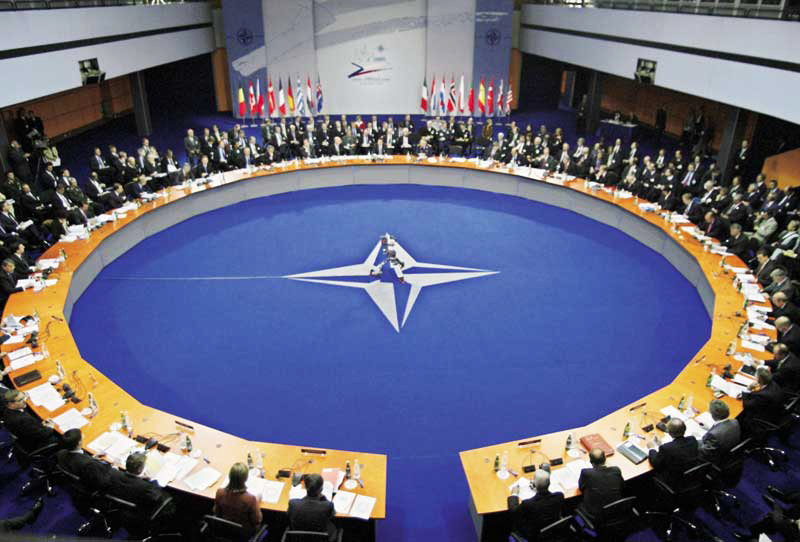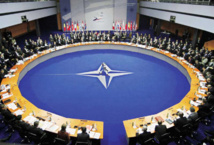That commitment is "iron-clad," NATO Secretary General Jens Stoltenberg added.
The statement wrapped up two days of events in and near London to mark the 70th anniversary of the defence alliance - overshadowed, however, by French criticism on the "brain death" of NATO.
French President Emmanuel Macron made the comment in the wake of US and Turkish military action in north-eastern Syria that threatened advances made against the Islamic State extremist group. He is calling for NATO to improve its strategic coordination.
As a consequence, the leaders invited Stoltenberg to propose a "forward-looking reflection process under his auspices, drawing on relevant expertise, to further strengthen NATO's political dimension including consultation."
Macron welcomed the "positive" outcome, while stressing that the process had to answer "existential questions" for the trans-Atlantic alliance.
These include the need for a "demanding" dialogue with Russia on security and stability in Europe, as well as deciding what NATO's "aims and modalities" are today, he said.
Macron said he thought that not everyone around the table considered Russia to be "the enemy" that it was 70 years ago. He also said that allies had an obligation not to confront one another "with a fait accompli" as with recent events in north-eastern Syria.
Many share Macron's desire to boost NATO's political clout, but his remarks have also drawn condemnation, especially from countries close to Russia that are worried about the message he may be sending to Moscow.
NATO is "the most important alliance in the world," said Polish President Andrzej Duda. "This alliance guarantees freedom and security."
"NATO's deterrence is 100 per cent credible," added Estonian Prime Minister Juri Ratas.
On Tuesday, US President Donald Trump lashed out at Macron, calling his remark "very nasty" and "insulting."
The 29 leaders took a series of decisions to strengthen the alliance, Stoltenberg said following their talks.
He declared that NATO has delivered on its so-called Readiness Initiative aimed at enabling land, air and naval forces to respond more quickly to threats.
"Our allies have committed 30 battalions, 30 air squadrons and 30 combat ships available to NATO within 30 days," Stoltenberg said.
NATO leaders also appeared to have resolved a spat with Turkey, after President Recep Tayyip Erdogan threatened to block defence plans for Poland and the Baltic states if allies do not recognize the terrorist threat that Ankara perceives from Kurds in north-eastern Syria.
"Today we have agreed to the updated plan for the Baltic countries and Poland," Stoltenberg said, while adding that the "well-known" differences with Turkey over the designation of Kurdish militias in Syria were not directly addressed.
German Chancellor Angela Merkel welcomed the "signal of unity" emerging from the summit.
The leaders met at a luxury golf resort in Watford, 25 kilometres north-west of London, for three hours of formal talks. On Tuesday, Queen Elizabeth II hosted an anniversary reception.
Issues on Wednesday's agenda included the fight against terrorism, arms control and relations with Russia, while for the first time ever, leaders discussed the rise of China.
"We recognize that China's growing influence and international policies present both opportunities and challenges that we need to address together as an alliance," leaders said in their statement.
"China is the second largest defence spender in the world next to the United States and recently displayed new modern capabilities including nuclear weapons," Stoltenberg noted.
The leaders pledged to ensure "the security of our communications, including 5G, recognizing the need to rely on secure and resilient systems."
Washington in particular is concerned that Chinese telecoms giant Huawei could pass sensitive information on to the government in Beijing.
The 29 allies formalized around 50 decisions adapting NATO to a changing global security environment. This included recognizing space as a fifth operational domain alongside land, air, sea and cyber.
Their joint declaration reiterated the allies' commitment to nuclear deterrence, increased defence spending and NATO's open door policy, which should see North Macedonia soon join as its 30th member.
The next summit will take place in 2021, Stoltenberg announced.
------------------------------------------------------------------------------------------------









 Home
Home Politics
Politics











